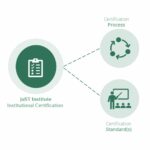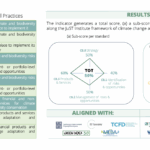
The JuST Institute Institutional Certification
The 2024 Cycle of the Institutional Certification (IC) by the JuST Institute has concluded in April 2025 marking an important milestone for financial institutions committed to aligning their operations with climate and biodiversity goals. As 2025 Cycle officially began in May 2025, we take a moment to reflect on the experience by the first group of certified institutions; how the process helped sharpen their strategies, uncover new opportunities, and reinforce their commitment to climate resilient, biodiversity positive and socially inclusive finance. At the same time, we look ahead with anticipation to the journey of the new institutions joining the 2025 Cycle, eager to strengthen their role in driving climate adaptation, biodiversity conservation, socio-economic inclusion and transparency in the sector.
Which institutions participated in the 2024 Cycle of IC?
Six Inclusive Financial Service Providers (IFSP) from four countries participated to the 2024 cycle:

What is the problem?
The IC aims to answer to a pressing problem: there is insufficient transparency about the quality of strategy, processes, products & services, monitoring and reporting (i.e. capacity level) of Inclusive Finance Services Providers (IFSPs) to support climate change adaptation & biodiversity conservation, in particular for smallholder farmers & rural clients. Finance hence cannot be tailored to the existing needs and efficiently reach the ones that needed the most to support their sustainable adaptation to climate change, while protecting biodiversity and enhancing their livelihoods.
Why the Institutional Certification?
Smallholders and rural communities are among the most affected by climate change and they play a key role in biodiversity conservation. Nevertheless, their access to finance for adaptation and biodiversity conservation is insufficient. One key barrier is the insufficient transparency and traceability of funds for climate change adaptation and biodiversity conservation and smallholder farmers and rural community level. The IC aims to break this barrier and contribute to enhance sector transparency and as a consequence capacity to improve.

What is the Institutional Certification?
JuST Institute’s Institutional Certification assesses the capacity of an IFSP1 to integrate climate change and biodiversity loss considerations into its strategy, risk management, products & services, monitoring & reporting, concerning its financial and non-financial activities to smallholder farmers & rural clients.
More than just a certification, the IC serves as a practical tool for identifying gaps and opportunities, understand institutional needs, offering guidance for improvements, inform targeted interventions, prioritize and plan interventions and monitoring, tracking, and verifying progresses. It helps organizations look inward while also building trust with external actors such as investors, international agencies, and regulators, that would like to promote more resilient and sustainable practices and technologies, while ensuring socio-economic inclusion.
Who is it for?
The present offer of Institutional Certification is designed for institutions that meet specific characteristics. To be eligible, an organization must be an Inclusive Financial Service Provider (IFSP), which includes entities such as microfinance institutions, fintech companies, local SME banks, and cooperatives, among others. These institutions must be engaged in financing low-income households, smallholder farmers, and Micro-, Small and Medium-sized Enterprises (MSMES). In addition, part of their lending portfolio must be dedicated to smallholder farmers agriculture or livestock.
Benefits of the Certification?
The IC can have multiple benefits to IFSPs, among which:
- Enhanced baseline for internal gap analysis, actions plan, and monitoring progress.
- Enhanced transparency towards external parties (regulators, investors, international agencies): status, impacts, and progresses.
- Enhanced capacity to attract dedicated funds, qualify for projects, and deliver impacts objectives.
Institutions that participate in the IC process gain a structured baseline for identifying internal gaps and developing action plans, which in turn helps monitor progress over time. The process also promotes transparency with external stakeholders by clearly communicating institutional status, impact, and development over time. Most importantly, it enhances the organization’s ability to attract climate-aligned funding, qualify for international partnerships and projects, and deliver on their impact goals with greater confidence and accountability.
What are the main elements of the IC?
JuST Institute Institutional certification is composed of 2 main items: a standard and a process.
The standard is the set of norms and indicators the performance of the IFSP is assessed against to assess its compliance with.
The process is the set of activities implemented to obtain the certificate.

What is the standard used?
While the Institutional Certification of the JuST Institute can be provided with various standards for social inclusion, environmental performance etc., for the first cycles of the JuST Institute Institutional Certification we focus on assessing the capacity of IFSPs to accompany smallholder farmers to adapt to climate change and to preserve biodiversity. For this scope we used the standard consisting in the indicators of the “Climate & Biodiversity Positive Initiative for Smallholder Finance” as the standard for climate change and biodiversity conservation for its smallholder farmers clients. The indicator generates a total score, (a) a sub-score per each standard, and (b) a sub-score along the JuST Institute framework of climate change and biodiversity loss risk and opportunity (se more details in the figure).

How does the process work?
The certification process aims to be an efficient and sound process to generate the certificate. It is based on the key concepts of:
- transparent and digital information management
- triangulation of information
- multiple layers of assessment
- and key, independent multiple converging third-party opinion: i.e. multiple experts independently look at the same reality and should see the same thing.
The Institutional Certification process unfolds through four key steps:

Training: The IFSP is trained by JuST Institute on the main items covered in the Institutional Certification Standard used and the details of its indicators – against which the IFSP’s practices will be measured in the next steps, as well as the process and scope of the certification.
Analysis: The IFSP provides information and evidence to assess its current approach to Biodiversity and Climate, at the level of strategy, risks, products & services, monitoring and reporting. The Analysist then assess the information and it generates an Analysis Score: consisting of a score per each indicator assessed as well as globally for the standard used and an Analysis Quality, consisting of an appreciation of the data and information management quality by the IFSP.
Verification: The Verifier replicates the Analysis process on the information provided by the IFSP, only on a selection of indicators: some specific key indicators of the standards plus some randomly selected indicators. The verifier generates a Verification Score, consisting of a score per each one of the indicator assessed, and Verification Quality.
Certification: The Analysis and Verification Scores are compared, and, thanks to a proprietary algorithm, the JuST Institute generates a Certification Score and Certification Quality level. IFSP receives a JuST Institute Institutional Certification that demonstrates where the IFSP stands in terms of current activities and efforts to incorporate Biodiversity and Climate into its operations and processes for its rural and agriculture smallholder lending portfolio.
These stages ensure that institutions are not only assessed rigorously but are also guided through capacity-building and continuous improvement. The three steps Analysis, Verification, and Certification are done by three independent experts or companies that should ensure the implementation of the key principle “multiple converging third-party opinion”.
What do the institutions receive in the end?

The Institutional Certification provides to the IFSP:
- a certification of transparency for all institution certified, that certifies that the institution is a transparent institution in terms of disclosure of its ability to integrate climate change and biodiversity loss considerations into its strategy, risk management, products and services, monitoring and reporting, in relation to its financial and non-financial activities to smallholder farmers and rural clients
- a set of scores representing the level of capacity of the institution to support climate change adaptation and biodiversity conservation for its rural and smallholders clients.
The certified IFSP receive in particular a certificate, a certification report, as well as other supporting material.
Example of Certificate

What IFSPs participated to the 2024 IC Cycle tell us about their experience?
The first cycle of the IC brought meaningful insights and momentum for participating institutions.
Do not just take our word for it, hear it directly from our certified institutions.
“L’expérience d’Al Amana avec la Certification Institutionnelle du JuST Institute constitue une étape structurante dans son engagement pour une performance durable et responsable. À travers ce processus de certification, Al Amana a bénéficié d’une évaluation indépendante et rigoureuse de ses capacités stratégiques et opérationnelles, en particulier en ce qui concerne la gestion des risques, la traçabilité, la transparence et l’adéquation de ses produits et services aux besoins des petits exploitants agricoles et des populations rurales.
Cette démarche a permis de faire émerger des axes de progrès, d’identifier des opportunités de renforcement et de mieux aligner ses pratiques avec les objectifs de résilience climatique et de préservation de la biodiversité.
Cette certification représente le point de départ d’un processus d’amélioration continue, dans lequel Al Amana s’inscrit résolument afin de consolider son impact et d’adapter durablement ses interventions face aux enjeux environnementaux et sociaux.”
— Al Amana Microfinance, Morocco
Translation:
“Al Amana’s experience with the JuST Institute Institutional Certification marks a foundational step in its commitment to sustainable and responsible performance. Through this certification process, Al Amana benefited from an independent and rigorous assessment of its strategic and operational capacities, especially in risk management, traceability, transparency, and the alignment of its products and services with the needs of smallholder farmers and rural populations.
This approach allowed for the identification of areas for improvement, opportunities for strengthening, and better alignment of practices with climate resilience and biodiversity conservation goals.
This certification represents the starting point of a continuous improvement process, in which Al Amana is firmly engaged to strengthen its impact and sustainably adapt its interventions to environmental and social challenges.”
« Pour nous, le choix de faire une certification institutionnelle Climat, Biodiversité et Finance Inclusive est un investissement certain et une démarche volontaire qui a permis de mieux appréhender notre capacité à prendre en charge les enjeux relatifs au changement climatique et à la perte de biodiversité. La notation obtenue de « Promoteur » nous a réconforté à intégrer la finance verte comme axe stratégique 2 dans notre Business Plan couvrant la période 2025-2029 afin de contribuer à l’atteinte des Objectifs de Développement Durable (ODD) . »
— Caurie Microfinance, Senegal
Translation:
« For us, choosing to pursue an institutional certification in Climate, Biodiversity, and Inclusive Finance is a clear investment and a voluntary initiative that has allowed us to better understand our capacity to address the challenges related to climate change and biodiversity loss. The rating we received of ‘Promoter’ reassured us in our decision to integrate green finance as Strategic Axis 2 in our Business Plan for the 2025–2029 period, in order to contribute to the achievement of the Sustainable Development Goals (SDGs)« .
To hear more about the experience of cycle 2024 institutions, check out the testimonial video by Banfondesa, from Dominican Republic https://youtu.be/wFnBh0S0vQI.
Aspirations for 2025 Cycle
The success of 2024 Cycle sets a strong foundation for the kick-off of the 2025 Cycle. As 2025 Cycle begins, participating institutions are setting ambitious goals for how the IC will support their growth and their climate resilience strategies.
« By joining the Institutional Certification Program with JuST Institute, we expect to leverage climate resilience into our financial solutions. The certification journey will enhance our ability to provide climate-smart financing that supports sustainable growth and promoting a green future as well. We want to best coat our commitment to climate finance in order to drive a continued refinement of our practices for a more resilient economic future. »
— VisionFund Rwanda
“Diaconía IFD se une al programa de certificación internacional con JuST Institute para promover la transparencia y definir claramente nuestro compromiso con transición justa y sostenible de las finanzas.
En Diaconía IFD, hemos emprendido un camino hacia la sostenibilidad, donde las Finanzas Sostenibles juegan un papel crucial. La certificación institucional con JuST Institute nos permitirá evaluar nuestras fortalezas y áreas de mejora, alineándonos con los estándares internacionales.
El proceso de certificación institucional fortalecerá el perfil de Diaconía IFD, facilitando el acceso a oportunidades de financiamiento y apoyando a los pequeños productores que enfrentan desafíos climáticos y de biodiversidad, promoviendo así un desarrollo económico inclusivo y responsable.”
— Diaconía IFD, Bolivia
Translation:
“Diaconía IFD joins the international certification program with JuST Institute to promote transparency and clearly define our commitment to a just and sustainable financial transition.
At Diaconía IFD, we have embarked on a journey toward sustainability, where Sustainable Finance plays a crucial role. Institutional certification with JuST Institute will allow us to assess our strengths and areas for improvement, aligning with international standards.
The certification process will strengthen Diaconía IFD’s profile, facilitate access to financing opportunities, and support small producers facing climate and biodiversity challenges, thus promoting inclusive and responsible economic development.”
As the Institutional Certification moves into its 2025 cycle, its growing impact is evident. The IC equips IFSPs to reflect, improve, and lead with transparency, positioning them as key actors in a more sustainable financial ecosystem.
Call for action
If you’re interested in learning more or considering the Institutional Certification for your institution or a partner institution, reach out to us at contact@justinstitute.org.